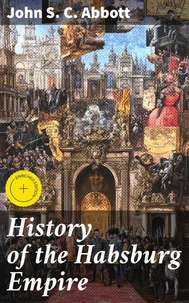The Rise and Fall of Austria or the Habsburg Empire. An Imperial Legacy: Austria's Monarchical Rule and European Influence
Par :Formats :
Disponible dans votre compte client Decitre ou Furet du Nord dès validation de votre commande. Le format ePub est :
- Compatible avec une lecture sur My Vivlio (smartphone, tablette, ordinateur)
- Compatible avec une lecture sur liseuses Vivlio
- Pour les liseuses autres que Vivlio, vous devez utiliser le logiciel Adobe Digital Edition. Non compatible avec la lecture sur les liseuses Kindle, Remarkable et Sony
 , qui est-ce ?
, qui est-ce ?Notre partenaire de plateforme de lecture numérique où vous retrouverez l'ensemble de vos ebooks gratuitement
Pour en savoir plus sur nos ebooks, consultez notre aide en ligne ici
- Nombre de pages399
- FormatePub
- ISBN859-65--4778086-1
- EAN8596547780861
- Date de parution17/12/2023
- Protection num.Digital Watermarking
- Taille980 Ko
- Infos supplémentairesepub
- ÉditeurGOOD PRESS
Résumé
In "The Rise and Fall of Austria or the Habsburg Empire, " John S. C. Abbott delivers a meticulously researched and engaging narrative chronicling the extensive history of the Habsburg dynasty. Through a blend of historical analysis and vivid storytelling, Abbott explores the political, social, and cultural dynamics that shaped the Habsburg Empire, from its ascendance in the late Middle Ages to its eventual dissolution after World War I.
His literary style reflects a didactic approach, utilizing accessible language and a chronological structure that guides readers through pivotal events and figures, making this intricate history comprehensible to both scholars and general readers alike. John S. C. Abbott, an American historian and biographer, was deeply influenced by the shifting political landscape of his time, particularly the tumultuous changes following the American Civil War.
His dedication to shedding light on the legacies of prominent historical figures and empires stems from his broader interest in the interplay between history and human progress. Abbott's extensive background in literature and his desire to facilitate an understanding of complex historical narratives have provided him with a unique perspective, enhancing the depth of his examination of the Habsburg Empire.
This book is highly recommended for anyone interested in European history, imperial studies, or the intricacies of dynastic power. Abbott'Äôs comprehensive approach not only illuminates the fascinating rise of one of Europe'Äôs most significant empires but also offers deep insights into the factors that contributed to its decline. Readers will discover a rich tapestry of history that resonates with contemporary themes of governance, culture, and identity.
His literary style reflects a didactic approach, utilizing accessible language and a chronological structure that guides readers through pivotal events and figures, making this intricate history comprehensible to both scholars and general readers alike. John S. C. Abbott, an American historian and biographer, was deeply influenced by the shifting political landscape of his time, particularly the tumultuous changes following the American Civil War.
His dedication to shedding light on the legacies of prominent historical figures and empires stems from his broader interest in the interplay between history and human progress. Abbott's extensive background in literature and his desire to facilitate an understanding of complex historical narratives have provided him with a unique perspective, enhancing the depth of his examination of the Habsburg Empire.
This book is highly recommended for anyone interested in European history, imperial studies, or the intricacies of dynastic power. Abbott'Äôs comprehensive approach not only illuminates the fascinating rise of one of Europe'Äôs most significant empires but also offers deep insights into the factors that contributed to its decline. Readers will discover a rich tapestry of history that resonates with contemporary themes of governance, culture, and identity.
In "The Rise and Fall of Austria or the Habsburg Empire, " John S. C. Abbott delivers a meticulously researched and engaging narrative chronicling the extensive history of the Habsburg dynasty. Through a blend of historical analysis and vivid storytelling, Abbott explores the political, social, and cultural dynamics that shaped the Habsburg Empire, from its ascendance in the late Middle Ages to its eventual dissolution after World War I.
His literary style reflects a didactic approach, utilizing accessible language and a chronological structure that guides readers through pivotal events and figures, making this intricate history comprehensible to both scholars and general readers alike. John S. C. Abbott, an American historian and biographer, was deeply influenced by the shifting political landscape of his time, particularly the tumultuous changes following the American Civil War.
His dedication to shedding light on the legacies of prominent historical figures and empires stems from his broader interest in the interplay between history and human progress. Abbott's extensive background in literature and his desire to facilitate an understanding of complex historical narratives have provided him with a unique perspective, enhancing the depth of his examination of the Habsburg Empire.
This book is highly recommended for anyone interested in European history, imperial studies, or the intricacies of dynastic power. Abbott'Äôs comprehensive approach not only illuminates the fascinating rise of one of Europe'Äôs most significant empires but also offers deep insights into the factors that contributed to its decline. Readers will discover a rich tapestry of history that resonates with contemporary themes of governance, culture, and identity.
His literary style reflects a didactic approach, utilizing accessible language and a chronological structure that guides readers through pivotal events and figures, making this intricate history comprehensible to both scholars and general readers alike. John S. C. Abbott, an American historian and biographer, was deeply influenced by the shifting political landscape of his time, particularly the tumultuous changes following the American Civil War.
His dedication to shedding light on the legacies of prominent historical figures and empires stems from his broader interest in the interplay between history and human progress. Abbott's extensive background in literature and his desire to facilitate an understanding of complex historical narratives have provided him with a unique perspective, enhancing the depth of his examination of the Habsburg Empire.
This book is highly recommended for anyone interested in European history, imperial studies, or the intricacies of dynastic power. Abbott'Äôs comprehensive approach not only illuminates the fascinating rise of one of Europe'Äôs most significant empires but also offers deep insights into the factors that contributed to its decline. Readers will discover a rich tapestry of history that resonates with contemporary themes of governance, culture, and identity.








